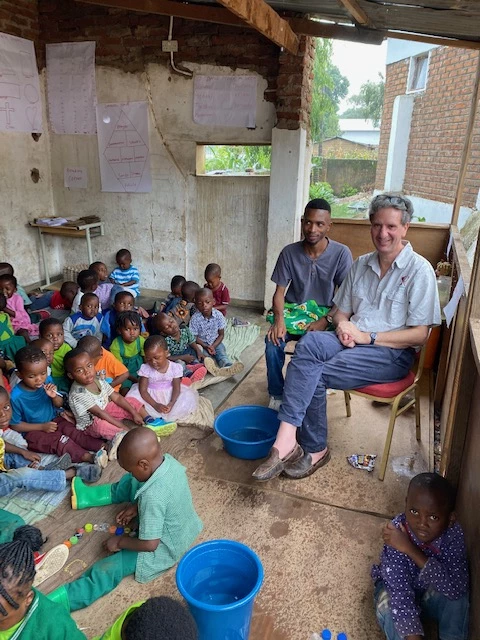
Partner Article
Somerset entrepreneur celebrates charity expansion on return from Africa
A Somerset-based entrepreneur who runs a charity dedicated to improving the lives of young children in Africa has marked the expansion of the charity’s work with a trip to the continent.
James Alexandroff is the settlor and trustee of the Perivoli Foundation, a UK registered charity that funds a nursery school teacher trainer programme in Sub-Saharan Africa called Perivoli Schools Trust.
“It’s really just Blue Peter on steroids,” says James. “We employ trainers to show the nursery school teachers how to make games and educational activities out of recyclable waste materials. They tend to have no money or training themselves, so this helps them to create play activities at no cost”.
The teachers are shown how to use things like yoghurt cartons, bottle tops, loo rolls, pieces of cardboard, discarded garments and tin cans to make stimulating activities from a toy shop to matching puzzles, counting games and dressing up corners.
James – a Bristol University alumni – established the programme in 2013 starting initially in Namibia and has since helped to train over 10,000 nursery school teachers in Namibia, Malawi and Zambia. The Trust is aiming is to reach up to 200,000 more teachers across nine countries in Sub Saharan Africa over the coming decades - ultimately helping more than 5 million children.
“The core aim of the Perivoli Schools Trust programme is to address very high dropout rates that children face once they reach state-funded primary school,” added James.
“Children who are not stimulated through play in their early years find it very hard to cope with formal education when they reach primary school.
“It is especially challenging for girls, who tend to fall pregnant once they reach puberty at 13 or 14 if they struggle at school. Studies show that a girl who can read has two children on average, whereas a girl who can’t has five. Our goal says is to get the girls to read before they leave nursery school.”
With the population of many African countries doubling every eight years, the size of the Continent is set to go from 17% of the world’s population today to more than 40% by the end of the century. The Perivoli Schools Trust programme could have important implications for the demographics of the region, as long as it can be scaled fast enough.
The purpose of James’ recent trip was to launch the programme in Botswana and Uganda, which takes the countries covered by the programme to five. It is run in each country entirely by local people and employs over 200 Trainers who interact with 25 nursery school teachers at a time, delivering sixteen training modules over two years. Once a teacher completes the course, they are awarded a Perivoli Certificate in a special graduation ceremony.
James said: “I have visited over a hundred schools across the countries where we work and always find it uplifting to see how thirsty the children are for stimulation and activity. This programme answers their call.
“The only cost we bear is the amounts we pay to the Trainers. In effect, assuming there are thirty children per classroom, this works out at about £3 per child per annum. Given the very positive impact on children’s lives, this is money very well spent.”
The Perivoli Schools Trust works closely with local Ministries of Education to champion the power of early years education, which is underfunded in Africa. The Government of Namibia currently spends USD 1000 per child at primary and secondary level, but only USD 20 at nursery school level.
The programme is funded by a separate Trust called Perivoli Innovations that James established in 2016 to invest in early-stage high-risk technology businesses in the UK and Africa, which have a positive societal impact.
“These countries simply don’t have the resources or the reach, so we are filling in an important gap,” says James.
“But it’s a race against time. We have to hope that with better education, people in countries in Sub-Saharan Africa will make wiser life choices, husband resources more carefully, pick better leaders and crucially attract more investment into more value-adding activities to drive up productivity which is, after all, the driver of standards of living and, up to a certain level of income, happiness.”
James returned to the UK earlier this year - before the Omicron variant of Coronavirus was first detected.
This was posted in Bdaily's Members' News section by Charlie Briegal .








 Raising the bar to boost North East growth
Raising the bar to boost North East growth
 Navigating the messy middle of business growth
Navigating the messy middle of business growth
 We must make it easier to hire young people
We must make it easier to hire young people
 Why community-based care is key to NHS' future
Why community-based care is key to NHS' future
 Culture, confidence and creativity in the North East
Culture, confidence and creativity in the North East
 Putting in the groundwork to boost skills
Putting in the groundwork to boost skills
 £100,000 milestone drives forward STEM work
£100,000 milestone drives forward STEM work
 Restoring confidence for the economic road ahead
Restoring confidence for the economic road ahead
 Ready to scale? Buy-and-build offers opportunity
Ready to scale? Buy-and-build offers opportunity
 When will our regional economy grow?
When will our regional economy grow?
 Creating a thriving North East construction sector
Creating a thriving North East construction sector
 Why investors are still backing the North East
Why investors are still backing the North East